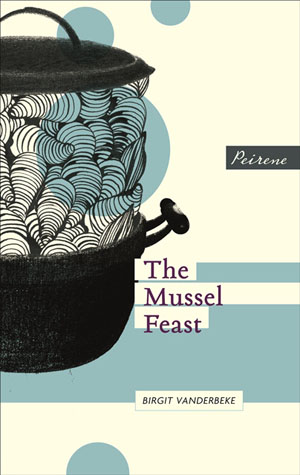
by by Margaret Kolb

Published by Peirene Press, 2013 | 105 pages
What constitutes “a proper family”? At what cost do we maintain a public image of familial harmony? In Birgit Vanderbeke’s The Mussel Feast – highly renowned in Germany since its publication in 1990, and translated here into English for the first time – the oppression of patriarchal dominance is linked with the broader violence of contemporary German nationalism and state control.
The Mussel Feast is set over a single evening and centres upon an unnamed family. The mother and her two children sit at the dinner table awaiting the father’s return, a pot of mussels rapidly cooling before them. The story is narrated by the teenage daughter, whose breathless monologue reveals the family’s troubled history and deep unhappiness. As the minutes tick past and the father fails to arrive, the family becomes increasingly vocal about the humiliations and anxieties that characterise their lives, fuelled in this collective confession by guilty slugs of wine.
At the very heart of The Mussel Feast is the absent father. In the eyes of his wife and children, he is a terrifying, tyrannical and hypocritical figure. A successful scientist, the father is said to stand for “sober objectivity and reason,” a man dismissive of music and literature. He rules the household by fear – “we thought he knew everything and could see and hear everything” – and is both visibly disappointed and pettily competitive when it comes to his children’s achievements. Having risen from a poor background, a fact which spurs and embarrasses him, he is painfully conscious of class – continually forcing his family to behave in ways he thinks their status demands.
The novella’s other characters have been distinctly marked by the verbal slights and physical violence the father has inflicted upon them. The mother is a teacher, whose own desires have been thwarted, ridiculed and ignored, and who is forced to switch to “wifey mode” whenever he comes home. The couple, we learn, were married suddenly after a pregnancy scandal and lived in a refugee camp before fleeing from East to West Germany. Their son is criticised for his “wimpishness” by the father, mainly because he is bad at football. The daughter, our narrator, is a tenacious and intelligent teenager, who has managed to carve out a space for herself, lingering in cafés and cinemas, and devouring books. The Mussel Feast is, in a sense, a record of the liberation of her voice – one filled with wit, vitality and passion despite claims she is “unlikeable” and “unappealingly stubborn” – which offers a female counterpart to Kafka’s famous letter to his father, another act of (symbolic) patricide.
Over the course of the evening (and the book), the narrator, along with her mother and brother, comes to understand that being “a proper family,” by its very nature, necessitates “sheer tyranny”:
I preferred us when my father was away on business. You see we all had to switch for my father, to become a proper family, as he called it, because he hadn’t had a family, but he had developed the most detailed notions of what a proper family should be like, and he could be extremely sensitive if you undermined these notions.Indeed, the very form of The Mussel Feast – lengthy paragraphs densely packed with extensive, multi-clause sentences, expertly translated by Jamie Bulloch – rebels against such forced unity. Notably, when discussing music, the narrator admits, “I find classical harmony, with its dominants and subdominants, extremely suspect.” In The Mussel Feast, Vanderbeke demonstrates an equal scepticism towards controlling literary forms in which everything is “stuffed into the harmony.”
This tale of a fragmenting family also has larger allegorical ambitions. The Mussel Feast was written in August 1989, three months before the Berlin Wall fell. It was first published the following summer, just before East Germany was absorbed by its Western neighbour. To an uncanny degree, the book speaks to, and anticipates, these historic events – from the allusion, in its opening paragraph, to an impending event “so monumental that none of us have got over it yet.” The dominant father, who declares “there’s no need for secrets” and who terrifies the rest of the family into fearing they might be “caught committing a secret crime,” seems to embody East Germany’s notorious security agency, the Stasi. The imminent collapse of the family also seems to stand for a disintegrating East German state desperately trying to hold on to power. At other times, though, the father seems to epitomise the arrogance and complacency of post-war West Germany. One crucial allegorical sign-post is his stamp collection. The father collects stamps from both sides of the Berlin Wall to help “achieve his dream of all-German completeness.” While he claims the stamp collection “only makes sense and has any value if it’s complete,” the narrator pointedly remarks that “striving for completeness had its price, too.” Once again, the book resists any unthinking celebration of unity, national or familial.
Perhaps The Mussel Feast’s most intriguing metaphors concern food – from the bananas smuggled from East to West Germany by the parents to an anecdote about how “our family unity was endangered” during a trip to the countryside when the mother forgot the salt needed to season hard-boiled eggs. From the title onwards, it is Vanderbeke’s adoption of mussels as the book’s central metaphor that encourages particular speculation. The image of something outwardly tough, but soft on the inside, might relate to the condition of the East German state in 1989. That mussels are contained, despite their urgent rattling, in a boiling pot brings further associations of a simmering family unit or a nation on the verge of revolution (even if mussels, like revolutions, can become cool and tasteless very quickly). The specific anatomical form of a mussel – consisting of two distinct halves that can be prised open, if still difficult to split entirely, by an outside force – might also allude to Germany’s post-war division. Indeed, this division has shaped Vanderbeke’s own life: she was born in East Germany in 1956 before moving to West Germany in 1961, just before the Berlin Wall was built – a journey echoed in The Mussel Feast.
All of which intimates why her novella has resonated so strongly in Germany – it won the prestigious Ingeborg Bachmann Prize and is now a set text for the nation’s school children. As Vanderbeke’s first book, it also launched a literary career than has since produced sixteen more novels. At a time when Germany’s role in sustaining European unity is under intense scrutiny – the country led by a dominant Chancellor many likely to call “Mutti” (“mommy” or “mum”) – the meanings of this fascinating book seem likely to multiply further in the future.
Richard Martin lives in Berlin. His first book, The Architecture of David Lynch, will be published by Bloomsbury in 2014. More of his writings can be found at: http://richardgmartin.org.















click to see who
MAKE Magazine Publisher MAKE Literary Productions Managing Editor Chamandeep Bains Assistant Managing Editor and Web Editor Kenneth Guay Fiction Editor Kamilah Foreman Nonfiction Editor Jessica Anne Poetry Editor Joel Craig Intercambio Poetry Editor Daniel Borzutzky Intercambio Prose Editor Brenda Lozano Latin American Art Portfolio Editor Alejandro Almanza Pereda Reviews Editor Mark Molloy Portfolio Art Editor Sarah Kramer Creative Director Joshua Hauth, Hauthwares Webmaster Johnathan Crawford Proofreader/Copy Editor Sarah Kramer Associate Fiction Editors LC Fiore, Jim Kourlas, Kerstin Schaars Contributing Editors Kyle Beachy, Steffi Drewes, Katie Geha, Kathleen Rooney Social Media Coordinator Jennifer De Poorter
MAKE Literary Productions, NFP Co-directors, Sarah Dodson and Joel Craig